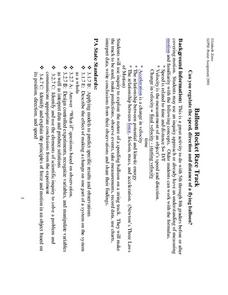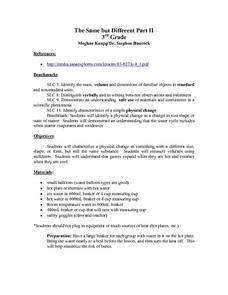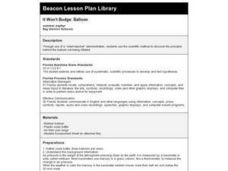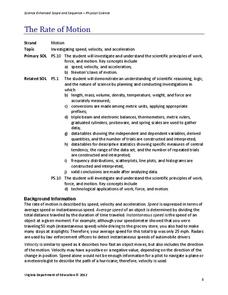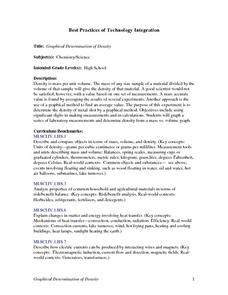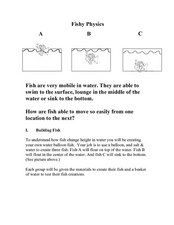Purdue University
Designing a Device Utilizing a Balloon Filled with Carbon Dioxide
Don't waste all that carbon dioxide. Scholars first produce carbon dioxide by mixing baking soda and vinegar. They measure the masses of the reactants and products to verify the law of conservation of mass. As a culminating activity,...
Curated OER
Balloon Rocket Race Track
Students discuss "How can we measure (or make it easier to record) the speed, distance or acceleration of the balloon?" They told that they are going to make a balloon racetrack. Pupils use meter sticks to accurately measure length and...
Curated OER
The Same, But Different Part II
Learners characterize a physical change as something that changes to a different size, but retains its basic substance. They measure volumes using milliliters, and perform an experiment that proves that gases expand when hot and contract...
Alabama Learning Exchange
Float or Sink?
Experiment with mass and density as scholars figure out what makes things float or sink. First, they watch a podcast introducing these concepts. Be sure to use the comprehension question to test their understanding. Young scientists...
Curated OER
Measuring and Comparing Weight and Capacity
First graders measure weight and capacity. In this measurement lesson, 1st graders explore visual examples of weight and capacity comparisons. Students also practice solving problems that their instructors model.
Curated OER
What is Air?
Learners investigate air by participating in a class experiment. In this matter measurement lesson, students identify air as a gas which consists of mass. Learners utilize a windsock or balloon to measure oxygen and explore it's true...
Curated OER
Hovercraft
Students assess human impact on water quality. They determine how the force of friction retards motion. Pupils describe and measure quantities that characterize moving objects and their interactions within a system: Time, Distance,...
Curated OER
Warm Air versus Cold Air
Students discover that warm air takes up more space than cold air. In this science lesson, students perform 4 experiments using balloons to determine that the molecules of warm air are more spread out than those of cold air.
Curated OER
It Won't Budge: Balloon
Eighth graders use the scientific method to discover why a balloon is not inflated.
Curated OER
Helium Balloon Race
Students determine the force of a helium balloon that allows it to rise a specific distance. In this helium lesson students calculate the amount of paper needed to construct a weight and determine the density of a piece of...
Curated OER
Go Car, Go!
Students design and build their own car. In this physics lesson, students collect data to determine the speed of the car. They plot the data on the graph analyze the relationship between variables.
Michigan State University
Gases Matter
Young scientists learn that seeing isn't necessarily believing when it comes to the states of matter. After performing a fun class demonstration that models the difference between solids, liquids, and gases, children complete a series of...
Virginia Department of Education
The Rate of Motion
How much time does it take to jump over three balloons? Pupils calculate the speed of tasks that require different motions. They determine motions for tasks such as walking, skipping, hopping, and jumping before creating a...
Curated OER
Graphical Determination of Density
Students determine the density of metal shot by a graphical method using significant digits in making measurements and calculations. Students graph a seris of laboratory measurements and determine density from a mass verses volume graph.
Virginia Department of Education
Matter and Energy: Equations and Formulas
Using simple materials, an informative instructional activity demonstrates the Law of Conservation of Matter and explains how to balance chemical equations. Young chemists perform experiments, analyze reactions, and balance...
Curated OER
Fishy Physics
Learners explore how fish are able to move easily from one depth to another in water. In this fish lesson students create their own balloon fish.
Curated OER
It's The States of Matter
Students investigate the properties of solids, liquids and gases. In this states of matter lesson plan, students observe dry ice and its characteristics. They calculate the density of dry ice and observe the sublimation of the dry ice...
Curated OER
Air Is there
Students experiment to observe air and its mass. In this air lesson, students use the scientific method to complete experiments that demonstrate the properties of air. Students view a video as follow-up.
Curated OER
Science: Solids
Second graders investigate the properties of solids and discover how to classify them. Using rulers, they measure various solids on display. In groups, they play an identification game where one students names a location, such as the...
Curated OER
A Matter of Fact
Third graders define matter as anything that takes up space and has mass, recognize, through experimentation and observation, that matter exists in three forms, including solid, liquid, and gas, and discuss characteristics of each form...
Curated OER
Weather Facts
Young scholars study weather and weather measurement tools. In this weather lesson, students read and discuss weather myths and superstitions as well as weather terminology. Young scholars then work in groups to complete weather stations...
Curated OER
Water and Ice
Students observe water as it changes form. For this water lesson students observe, measure, and describe water as it changes state.
Curated OER
Balancing Bottles
Students explore the Law of Conservation of Matter using effervescent tablets. In this mass and energy lesson, students investigate how mass is conserved in the reaction of effervescent tablets and water. They will discuss and...
Curated OER
The Same but Different Part II
Third graders experiment with beakers of water and balloons to measure the volume of the gas in the balloon. They determine ways to change the volume of air in the balloon which changes its size but not its physical state. By heating the...

